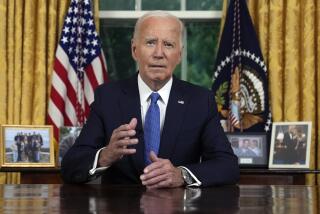Obama notes end of Iraq mission, talks of economy
Reporting from Washington — President Obama marked the end of America’s combat mission in Iraq with an Oval Office speech Tuesday night, acknowledging the “huge price” paid and ushering in a new era in which a reduced U.S. military force will let Iraqis take the lead role in building a democratic society.
In a noteworthy concession to his political predicament on the domestic front, Obama devoted part of the prime-time speech to the ailing economy. He said the “central responsibility” of his presidency is reviving the economy, and he blamed massive spending on wars in Iraq and Afghanistan -- citing a figure of more than $1 trillion -- for contributing to rising U.S. deficits.
“Our most urgent task is to restore our economy and put the millions of Americans who have lost their jobs back to work,” he said.
Obama praised the 1 million American troops who served in a seven-year war that he opposed as a U.S. senator from Illinois. As of this moment, he said, the military mission has fundamentally changed.
“So tonight, I am announcing that the American combat mission in Iraq has ended. Operation Iraqi Freedom is over, and the Iraqi people now have lead responsibility for the security of their country,” he said.
Obama added that the U.S. “has paid a huge price to put the future of Iraq in the hands of its people. We have sent our young men and women to make enormous sacrifices in Iraq, and spent vast resources abroad at a time of tight budgets at home.”
The war toll was substantial: More than 4,400 American soldiers died and more than 31,000 were wounded. Tens of thousands more Iraqis were killed.
Obama used the grand setting of a refurbished Oval Office to announce a milestone that his White House has portrayed as a campaign commitment now fulfilled. He devoted his weekly address Saturday to the withdrawal of the remaining combat troops.
On Tuesday morning he made a quick visit to an Army base in Texas to greet troops who will deploy to Iraq as part of the new support mission, dubbed Operation New Dawn. Mindful of the infamous “Mission Accomplished” banner of May 1, 2003, that dogged George W. Bush’s presidency, Obama promised Army personnel at Ft. Bliss that he wouldn’t take a “victory lap” on the Iraq withdrawal.
As he traveled to Texas, Obama spoke to Bush, who had announced the start of the war in an Oval Office speech delivered in March 2003. White House aides declined to release details of what they said was a private talk.
In his speech, Obama offered guarded praise for Bush, whose policies he often derides.
“It’s well known that he and I disagreed about the war from its outset,” Obama said. “Yet no one could doubt President Bush’s support for our troops, or his love of country and commitment to our security.”
Republicans said they found Obama’s war strategy worrisome.
House Republican leader John Boehner of Ohio called on Obama to detail how the U.S. will respond should Iraq spiral into chaos after the Americans leave.
“The hard truth is that Iraq will continue to remain a target for those who hope to destroy freedom and democracy,” Boehner told the American Legion in Milwaukee. “The people of that nation -- and this nation -- deserve to know what America is prepared to do if the cause for which our troops sacrificed their lives in Iraq is threatened.”
Iraq’s political future remains uncertain. Elections in March failed to produce a clear winner, and rival factions have been unable to agree on a governing coalition.
In his speech, Obama encouraged Iraqi leadership to form an inclusive government that is “just, representative and accountable” to its people.
The end of combat operations announced began with an agreement forged at the close of the Bush administration. Before Bush left office, his administration officials reached an agreement with the Iraqi government to ratchet down the American military commitment in phases, culminating with the complete withdrawal of U.S. forces by the end of 2011.
Senate Republican leader Mitch McConnell of Kentucky, in a statement released before Obama’s speech, said that Bush deserved credit for the current state of play.
“So it makes it easier to talk about fulfilling a campaign promise to wind down our operations in Iraq when the previous administration signs the security agreement with Iraq to end our overall presence there,” McConnell said.
A total of 50,000 U.S. troops will remain in Iraq for more than another year. Obama said he would meet the pledge to withdraw all forces by the end of next year.
Vice President Joe Biden was in Iraq on Tuesday to assure Iraqi leaders that the U.S. was not turning its back on them as the combat operations come to a close. He is to preside over a formal change-of-command ceremony Wednesday.
“Through this remarkable chapter in the history of the United States and Iraq, we have met our responsibility,” Obama said. “Now it’s time to turn the page.”
For all the talk about Iraq, the economy is clearly a preoccupation for Obama.
Polls show the 9.5% unemployment rate far outweighs the Iraq war as a source of concern for Americans. Surveys also show widespread dissatisfaction with Obama’s handling of the economy.
With midterm elections approaching and voters feeling restive, White House advisors concluded that Obama couldn’t ignore the economy even in a speech devoted to a major turning point in the Iraqi engagement.
Obama made it clear that he grasps the nation’s anxious mood. Going forward, he said, the economy trumps all else -- including, by implication, the work in Iraq and the war in Afghanistan.
“Our most urgent task is to restore our economy and put the millions of Americans who have lost their jobs back to work,” he said.
He added that the U.S. must “jumpstart industries that create jobs” and encourage innovation. That, he said, “must be our central mission as a people and my central responsibility as president.”
A White House official said Tuesday that the president wanted to take some of the resources flowing to the Iraq and Afghanistan war efforts and “refocus” them into the U.S. economy.
As one war winds down, another is picking up. Obama has long considered Afghanistan the real front in the fight against terrorists. He has reduced the number of troops in Iraq by nearly 100,000 while ramping up the number deployed in Afghanistan.
Yet looming over that conflict is Obama’s promise of a troop drawdown in Afghanistan in next July amid great instability in the U.S.-supported Afghan government. Obama has said that withdrawal is contingent on conditions in Afghanistan at the time.
More to Read
Sign up for Essential California
The most important California stories and recommendations in your inbox every morning.
You may occasionally receive promotional content from the Los Angeles Times.











